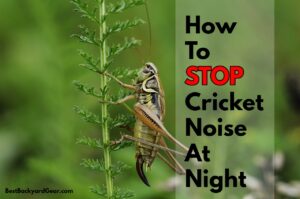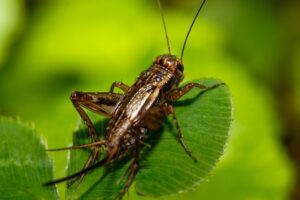 You’re lying in bed at night on a warm summer’s evening, ready to drift off to sleep when suddenly you become aware of a noise coming from outside. Crickets. LOUD crickets. And once you hear them, you can’t NOT hear them. To YOU, their chirps are not soothing at all… in fact, they are down right annoying and sleep disrupting. Thankfully, there are some things you can do to stop (or at least lessen) that infernal noise. How to stop cricket noise at night is what we’re talking about today.
You’re lying in bed at night on a warm summer’s evening, ready to drift off to sleep when suddenly you become aware of a noise coming from outside. Crickets. LOUD crickets. And once you hear them, you can’t NOT hear them. To YOU, their chirps are not soothing at all… in fact, they are down right annoying and sleep disrupting. Thankfully, there are some things you can do to stop (or at least lessen) that infernal noise. How to stop cricket noise at night is what we’re talking about today.
Closing your windows or putting in ear plugs are just temporary solutions – but they may help you in a pinch. Focusing on more of a permanent solution would be a very good idea though.
Basic Info About Crickets
There are a few basic things you need to know about crickets in order to handle the removal OF those crickets from your property.
 Crickets are nocturnal. If you think a quiet day time means you’ve succeeding in eradicating them, you’re in for a rude awakening (unfortunately, possibly literally).
Crickets are nocturnal. If you think a quiet day time means you’ve succeeding in eradicating them, you’re in for a rude awakening (unfortunately, possibly literally).- Crickets are most active when it is warm outside, so a summer’s evening when it’s 80 to 90 degrees f outside is their favorite time.
- Crickets can live without food or water for up to 2 weeks.
- Crickets have a lifespan of about 8 to 10 weeks.
- Cricket females lay their eggs in the ground – likely on your lawn.
- Crickets love to hide in dark and moist hiding places
How To Stop Cricket Noise At Night
There is unfortunately no magic button that you can press to turn off the noise on a particular night you can’t sleep, but there are things that you can try that should help minimize their presence and activity during your sleeping hours.
These can be separated into long range plans, and short, try-it-now ideas.
The Long Game: Declare War, Make Your Plans
If you hate cricket noise at night (and care about the damage they do to your lawn, and do NOT want them to find their way into your house), there are some steps you can take to do battle with them effectively, but they don’t become effective OVERNIGHT. These are longer range plans.
This includes checking for cricket mounds early in the season and drowning them with a dish-soap and water solution, use of lawn insecticides on your lawn, and block any access points in your house or sheds by spraying insecticide and laying traps.
Check out this “how to get rid of crickets” video by Home Depot for a step by step, laid out plan.
Add To Your Army: Bring In Predators

Draw in birds and bats (set up bird feeders, bird houses, bat houses). Add snakes (hmmm… maybe not). Purchase frogs and toads to add to your pond (if you have one). And consider letting the cat outside at night. These may make a big difference to your cricket population over the long term.
The Short Game: Quick Ideas To Get Rid of Crickets In Your Yard
If you don’t want to wait until next spring to plan your full out war on crickets, there are several things you can do to minimize their presence RIGHT AWAY.
Get That Yard Work Done
Clean up your garden beds as best as you can, removing any potential hiding places as best as you can. Crickets seek shelter, and their preference is anywhere moist and dark. So, tidy up, remove any clutter, bag up and dispose of leaf cuttings (which they like to eat) and if you find any crickets while doing this yard work, well, you know what to do. 🙂
- Keep your grass cut nice and short. Crickets LOVE tall grasses because they feel protected in there – so if you cut your lawn very regularly, you will be taking away their safety.
- If you are able to get some insecticide, give your lawn and gardens a good dousing. Keep your pets away for a bit (read any instructions for the advised length of time).
Turn Off Any Outdoor Lights
Cricket are attracted to light at night, so if your house is the only thing lit up at night, guess where they will be pulled towards? And yes, that includes light coming through windows.
Set Out Cricket Traps
This is a great idea if you have a general inkling of where the noises are coming from. Cricket traps are not expensive, and they actually work. Although most are designed for indoors, you can absolutely give them a try outside as well – especially if you have locations like a deck or patio that may be drawing them near.
Most cricket traps, like the ones here, work by enticing the cricket onto a pad, which is covered with a sweet-smelling, sticky substance that traps them in place.
If you want to build yourself some DIY cricket traps (tons of ideas on youtube), bait for home-made cricket traps is cheap and easy to figure out as well. Crickets are omnivorous, but their preference seems to be semi-rotten plant matter, fruit, and fungi. Oddly enough, soggy cardboard also seems to be a draw for them – and many people say that if you drizzle a bit of honey on and around the cardboard, crickets can’t resist it.
Spray Vinegar Water
Vinegar quickly kills crickets, and is not poison to your pets. Although you would never want to cover your grass or plants with a spray of vinegar water, vinegar will do no damage to a wood deck! In fact, many people use vinegar solutions to kill the algae on their wooden fences and decks. So if you sense your cricket issues are coming from crickets hidden around or under your porch, get some vinegar into a spray bottle and have some fun spraying all over the deck. See if it helps!
Get Out The Essential Oils

So if you have a good supply of essential oils, spritz around your doors or windows to prevent any crickets from venturing too close to where you are sleeping at night.
Alternatively, maybe consider doing some rearranging of your flower bed and make room for some mint? Add a lemon or eucalyptus tree to your yard? Hmm.
Why Do Crickets Chirp, Anyway?
Did you know that the chirping noise we hear is actually only MALE crickets? Females literally can not chirp.
If you listen closely there are 3 slightly different sounding chirps that a cricket will make:
- A mating call, announcing his presence and “availability” – these are the loudest and most common
- A warning to a rival who is getting too near his desired female – these are sharper and quicker
- A courting serenade to woo the female, to “seal the deal” so to speak – these are softer and gentler
Intrigued? Check out this short video about crickets and their chirps.
There are a lot of people who actually enjoy the sound of crickets, and claim it helps soothe them off to sleep. In fact, you can find many videos and play lists that feature cricket noises to allow people to do just that! But if cricket noise at night is something that makes your teeth set on edge, you definitely need to get to work and get rid of them so you can have a good night’s sleep once again.
Hopefully these ideas on how to stop cricket noise at night were helpful to you! Best of luck!

 Clean up your garden beds as best as you can, removing any potential hiding places as best as you can. Crickets seek shelter, and their preference is anywhere moist and dark. So, tidy up, remove any clutter, bag up and dispose of leaf cuttings (which they like to eat) and if you find any crickets while doing this yard work, well, you know what to do. 🙂
Clean up your garden beds as best as you can, removing any potential hiding places as best as you can. Crickets seek shelter, and their preference is anywhere moist and dark. So, tidy up, remove any clutter, bag up and dispose of leaf cuttings (which they like to eat) and if you find any crickets while doing this yard work, well, you know what to do. 🙂



